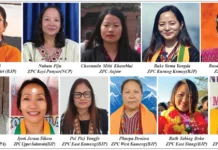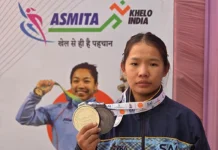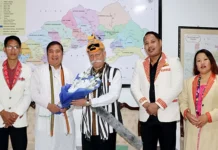BASAR, 5 Aug: The ICAR Regional Centre for NEH Region here in Leparada district recommended continuing of shifting cultivation with scientific interventions, stating that shifting cultivation solely by itself could risk the loss of valuable local germplasm.
The centre’s Head Dr Lobsang Wangchu made the recommendation during a workshop on climate change and its implications here on Tuesday.
“As shifting cultivation could risk the loss of valuable local germplasm, it is recommended that shifting cultivation be continued with scientific interventions along with documentation of traditional practices to preserve indigenous knowledge and biodiversity,” Dr Wangchu said.
He suggested forming a “state variety release committee” in Arunachal Pradesh, to be led by the Agriculture Department.
The workshop on ‘Transforming food, land, and water systems to combat the climate crisis in Arunachal Pradesh’ was held under the National Innovations on Climate Resilient Agriculture (NICAR) here on Tuesday.
Earlier during the inaugural ceremony, Dr Wangchu highlighted the critical role of the NICRA project in advancing soil moisture conservation in the region. He also outlined the ICAR Basar’s research activities.
Sub-Divisional Officer Dr Mary N Taloh emphasized the need for developing sustainable and climate-resilient technologies to boost agricultural production and productivity. Dr Taloh said that innovations in agriculture sectors should be effectively transferred to farmers’ fields through field demonstrations.
Agriculture Marketing Director Balung Mengu highlighted the importance of natural farming and promoting eco-friendly agricultural practices to ensure sustainability in the face of climate challenges.
Horticulture Joint Director Tobom Bam spoke on the global concern of climate change, stressing the need for both mitigation and preventive measures. He urged individuals to take local-level responsibility in combating global warming.
During the technical session, Bam delivered a presentation on climate-resilient strategies in horticulture, like peripheral plantations, intercropping with medicinal plants, and the use of shade nets and biopesticides to mitigate climate risks.
Soil Science expert Dr Ampee Tasung highlighted the objectives and achievements of the NICRA and implementation of double-cropping in jhum areas of Arunachal to increase cropping intensity.
IMD STO Kaushik Bhagawati spoke on the impacts of increasing intensity of rainfall, as well as reduction in rainy days and its impact on the cropping system in different agro-climatic zones of Arunachal.
Entomologist Techi Taura spoke on the importance of afforestation with indigenous trees species. He emphasized the need to promote and release local varieties of staple crops of Arunachal, like rice and maize in the western regions, as well as millets and tapioca in the eastern areas of the state.
Additionally, he suggested identifying and studying early sowing rice varieties as the rainfall pattern shows shortage of rainfall in the July-August months.
The workshop was organised by the ICAR RC for NEH Region here under the PM’s departmental summit initiative.




